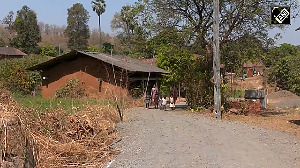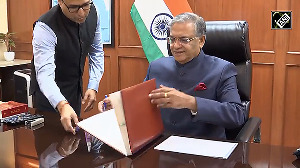This week Tunisia hosts a "World Summit on the Information Society". Some 50 or so heads of state or government and a couple of hundred corporate leaders are expected to be part of the 15,000 or so who will gather in Tunis for this. India, the self-proclaimed info-tech superpower, will be represented at a ministerial level with a modest corporate presence.
The summit is primarily about the digital divide, the yawning gap between developed and developing countries in the access to and use of information and communication technologies. It will showcase partnerships and launch a digital solidarity fund to help poor countries. But the big issue at the summit is clearly Internet governance.
In some ways the term governance is misleading.
The Internet is quite different from the telecom system or the postal system. The Internet requires very little by way of legislation from governments. Its standards are set, for the most part, by a network of Internet professionals and by commercial enterprises. It does depend on the telecom infrastructure where the process of standard setting has a major role for governments and related UN bodies like the International Telecommunication Union.
Part of the problem is this culture clash between the telecom administrations used to centralised direction and management, and the Internet professionals who are more anarchic, more libertarian, and perhaps more innovative. Unlike telecom the Internet is non-hierarchic in its mode of communication and decentralised in its mode of development.
The Internet connects networks of computers. When a message goes from one computer to another (an e-mail or a request for information, for example) the path that it follows is a bit like a note passed from person to person in a classroom.
Each node in the network asks whether the message is addressed to it or to someone nearby. If not, the node passes it along, preferably in a direction different from the one from which it came.
Such a network requires clarity and uniqueness in the addressee names and an agreement on how to handle incoming and outgoing messages. But the actual path of a message is through a flat rather than a hierarchic network.
The Internet developed in research labs and it continues to be the favoured hunting ground for maverick inventors and innovators.
There is a global process called the Internet Engineering Task Force, which brings professionals together to agree on protocols. (In the context of the classroom example it would be like bringing all students together to agree that each one would pass on any message received.) But much of the development takes place at the edges.
The World Wide Web and the graphical interfaces in the form of the web browsers is one example. There are more examples of standard-setting applications in areas like web-based e-mail, streaming video, search engines and Voice over Internet Telephony. Many of these are a product of the growth of commercial interest in the Internet.
What then is the bone of contention? As said above, the Internet requires a unique address for each person connected to the Net at any given time. This address is a four-part number that you sometimes see. But such complicated numbers are difficult to remember and hence the pioneers of the Internet developed a simpler name-based system.
It is called the Domain Name System. In order to ensure identifiability and uniqueness, the overall management of the DNS and the number allocation function are centralised in a not-for-profit California corporation, the Internet Corporation for Assigned Names and Numbers and the Internet Assigned Numbers Authority.
Both of these are subject to oversight by the US government's department of commerce. This is what many countries want changed. Some want a formal intergovernmental council and some like the EU ask for "a new model of cooperation".
No government wants to interfere in the day-to-day operational and technical management of the Internet. The dispute is about whether governments should be involved in the limited amount of central management that takes place at present.
Internet professionals in general are against this, and this is reflected in many of the comments on this subject in the trade press.
There are fears that governmental engagement will lead to stronger controls on content and possibly censorship. Frankly, a government, which wants to control content can already do so reasonably effectively provided it has national levers of control in its hands. Moreover, there are issues like privacy, cybercrime, and spam, which may require legislative or executive action by governments.
Those who want change must accept that the system is working well, which is a testimony to the competence of its present custodians and managers.
The US government has not abused its powers to control the Net and has exercised its oversight responsibilities with a light hand.
And let us face it. This was a US innovation, sponsored by the government, which they have generously shared with the world. But the flip side of this is that US corporations like Verisign, CISCO, Microsoft, Google, E-Bay, Amazon, and Yahoo dominate the Net.
The Internet may not be broken but its governance may need preventive maintenance to ensure its continued viability. The Internet is changing in terms of the character of its users and in terms of its uses.
Internet use is going to grow mainly in the developing countries, particularly in Asia. In these countries, it will be used more for public service applications and for information dissemination than for e-commerce. The use of languages other than English and non-Latin scripts will increase enormously.
There is a convergence of the Internet, telecommunications, and mass media. We already have voice-over-Internet telephony. The sharing of music files is widespread and will affect the video business as broadband use spreads.
At a more futuristic level, technologists are planning an Internet of things for remote management of devices. The Internet of the future will inevitably be subject to formidable commercial pressures.
Internet governance must respond to these emerging changes and find space for developing country professionals and for governments in its decision-making structures. If Tunis fails to resolve the differences on this score, then the institutions involved in managing the Net at the global and the national levels are in for very turbulent times.
The author was the Chairman of the Working Group on Internet Governance set up by the United Nations to prepare for the Tunis Summit. The views expressed in this article are strictly personal and should not be attributed to the Working Group or the United Nations.







 © 2025
© 2025